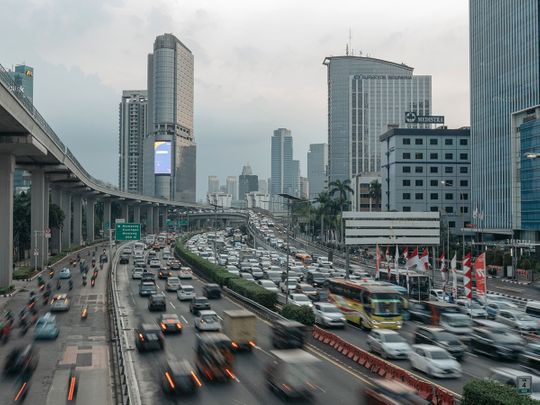
Days after the successful completion of presidential elections the Organisation of Economic Cooperation and Development (OECD), headquartered in Paris, announced that the group will formally open accession talks with Indonesia soon.
Speaking on the decision, the OECD Secretary General Mathias Cormann said, “as the largest economy in Southeast Asia and the world’s third-largest democracy, Indonesia is a significant global player, providing important leadership across its region and beyond.” According to Cormann, Indonesia’s membership of the group, “will have a ripple effect on the region, prompting the development of other economies.”
The OECD founded in 1961 as a club of the ‘privileged’ has now expanded to 38 members but only two — Japan and South Korea from Asia. In sixty years of OECD’s existence the global economic landscape has completely transformed.
Asia now boasts the biggest economy with nominal GDP of approximately $42 trillion (2023), whereas North America accounts for only about $28 trillion (2022). Within Asia — China, India and Southeast Asia have particularly strengthened their global economic presence and these countries are non-members.
An organisation, nominally comprised of developed nations finds it a challenge to its credibility when some of the biggest economies are outside its fold. Getting Indonesia in — the fourth biggest country with a fast-growing economy would promote OECD’s relevance.
President Joko Widodo — commonly known as Jokowi, announced during his second inauguration in 2019 that Indonesia aims to become a developed country by 2045. Some sceptics felt that it will be difficult to attain the levels based on the current growth trajectory coupled with a relatively large population.
Indonesia formally sought the OECD membership in 2023. If approved, Indonesia will be the first Southeast Asian states to join these 38 member elites “club of developed countries”. A candidate country must pass a review to satisfy that “it meets OECD standards in all the necessary policy areas.”
Fastest growing major economies
Southeast Asia’s largest economy, with over 279 million people, has been increasing its diplomatic and economic footprint, especially after chairing G20 summit in 2022 and ASEAN the following year. The country is also known as the world’s largest producer of nickel, a key material for batteries used in electric vehicles. It has a nominal GDP of 1.54 trillion (2024 estimates) with $4.72 trillion economy according to PPP standing at 16th nominal and 7th according to the PPP (2024 estimates.) It recorded at a 5.31 growth in 2022 and 5.17 per cent in Q2 of 2023, making it one of the fastest growing major economies in the world.
Given the size, potential and geostrategic importance of Indonesia, Japan had long desired Indonesia’s membership.
Indonesia believes that OECD institutional reforms, to meet the group’s high regulatory standards, will become benchmarks and pave the way to achieve Indonesia’s goal to be a developed country by 2045. The OECD membership will improve Indonesia’s reputation for stability, which will then attract foreign investment. This will, in turn spur trade and exports from Indonesia.
While Indonesia’s groundwork for membership started after announcing its plans in 2019 President Jokowi met with the leaders of Netherlands, France and Italy during the G-20 Summit in Jakarta in 2022 seeking their support for Indonesia’s membership of OECD. In November, when he was in the US that year he secured President Joe Biden’s backing for the membership.
Recent experiences have shown that new applicants like Colombia and Costa Rica had to wait for six to seven years to become members. With this precedent, Indonesia may well have to wait till about 2030 to become part of OECD.
“We perceive our accession to the OECD to contribute to global standard setting regardless of global political dynamics,” said Indonesia’s ambassador to Japan Heri Akhmadi, reflecting upon the confidence in joining the club.
It is indeed a matter of time when the pendulum will finally shift Asia’s way.
Sajjad Ashraf served as an adjunct professor at the Lee Kuan Yew School of Public Policy, National University of Singapore from 2009 to 2017. He was a member of Pakistan Foreign Service from 1973 to 2008 and served as an ambassador to several countries.








